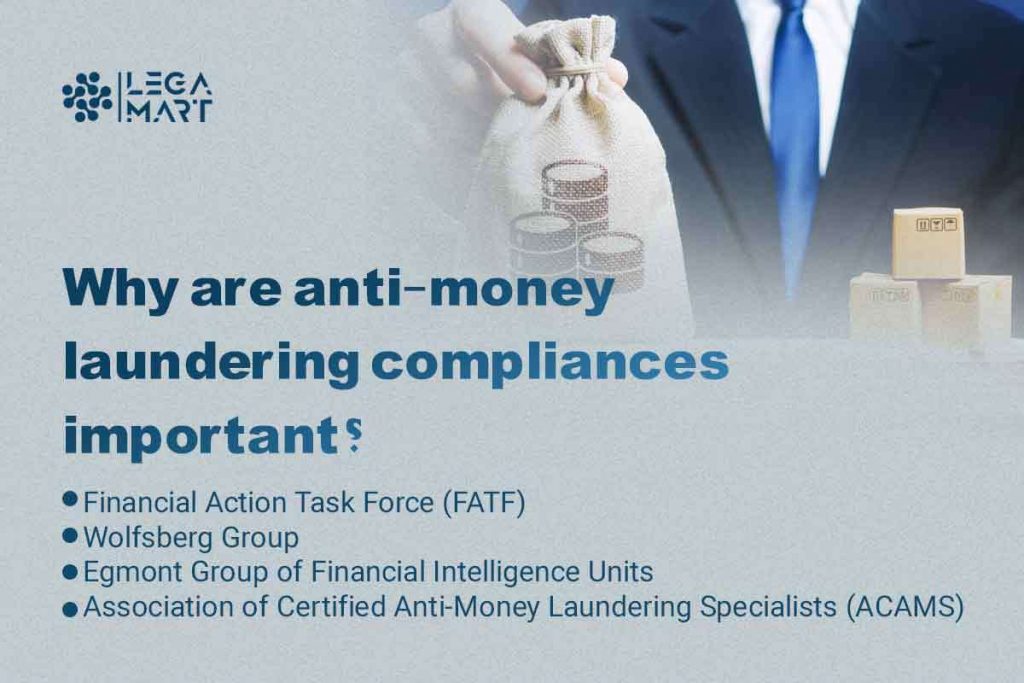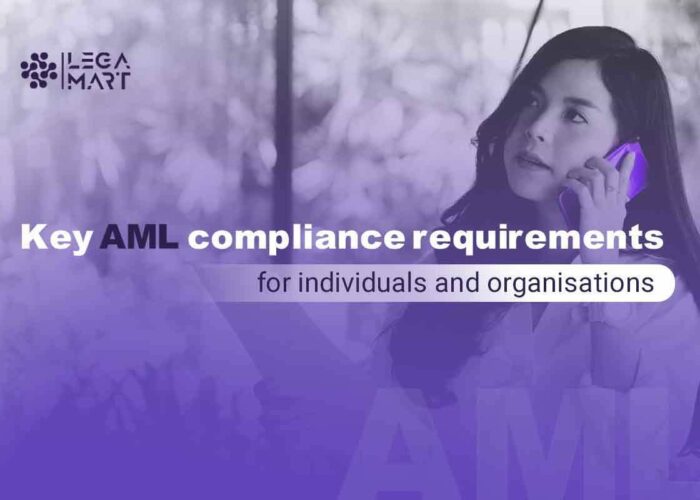- What is anti-money laundering?
- Origin and history of anti-money laundering and sanction compliance
- Primary purpose of anti-money laundering and sanction compliance
- Why are anti-money laundering and sanction compliances important?
- Key Anti-Money Laundering and Sanction Compliance requirements for individuals and organisations
- Laws on Anti- Money Laundering and Sanction Compliances in different countries (USA, UK, Australia, Canada, India, Europe)
- Conclusion
People, corporations, or entities cannot conduct business or transact money with sanctioned countries as a result of the restriction imposed on them by the other nation making it illegal for any citizen to do any transactions and breaking the law them by sending money to sanctioned countries, which amounts anti-money laundering, a criminal offence. To rectify this issue, various anti-money laundering and sanction compliance authorities and programs have been established that require financial institutions to record and verify the identity of their customers along with other responsibilities.
What is anti-money laundering?
Anti-money laundering (AML) refers to a set of laws, regulations, and procedures that aim to prevent, detect, and respond to activities that involve illegal financial transactions. Money laundering converts “dirty” money earned through illegal activities such as drug trafficking, corruption, or terrorism into “clean” money that can be used without detection. AML laws and regulations are designed to disrupt this process by creating a system that makes it challenging to move money illegally and without detection.
Origin and history of anti-money laundering and sanction compliance
The concept of money laundering dates back to the 1920s when the prohibition era in the United States saw a rise in the criminal underworld. The increased profits from illegal activities, such as bootlegging and gambling, prompted criminals to devise ways to hide their ill-gotten gains. In the 1970s, the issue of money laundering gained international attention with the rise of global drug trafficking. The United States took the lead in addressing the problem, passing the Bank Secrecy Act (BSA) in 1970, which required financial institutions to report suspicious activity to law enforcement agencies.
In the years that followed, the issue of money laundering gained more attention, and countries worldwide began to develop their anti-money laundering laws and regulations. In 1989, the Financial Action Task Force (FATF) was established by the G7 to develop international standards and promote the effective implementation of measures to combat money laundering. The FATF has since become the global standard-setter in the fight against money laundering, and its recommendations are followed by over 200 countries.
Primary purpose of anti-money laundering and sanction compliance
The primary purpose of anti-money laundering compliance is to prevent criminals from using the financial system to launder their ill-gotten gains. By implementing effective AML procedures and controls, financial institutions can identify and report suspicious activity, which helps law enforcement agencies investigate and prosecute criminal activity. The ultimate goal is to disrupt the flow of illegal funds and prevent criminals from benefiting from their illicit activities.
Why are anti-money laundering and sanction compliances important?

Anti-money laundering compliance is important for several reasons. First and foremost, it is essential in the fight against organised crime, drug trafficking, and terrorism. Criminal organisations and terrorists rely on the financial system to move their funds worldwide. By implementing effective AML procedures, financial institutions can disrupt this flow of funds and prevent criminals from profiting from their illegal activities.
Secondly, AML compliance is essential in protecting the reputation of financial institutions. A failure to comply with AML regulations can lead to significant fines, legal action, and damage to the institution’s reputation. It is, therefore, in the best interests of financial institutions to comply with AML regulations and maintain the trust of their customers and stakeholders.
Brief overview of international organisations promoting and enforcing anti-money laundering (AML) and sanction compliance
There are several international organisations and financial institutions dedicated to promoting and enforcing anti-money laundering (AML) compliance across different countries and regions. Some of the most prominent ones include:
Financial Action Task Force (FATF)
Year of Establishment: 1989
Country: Based in Paris, France, with member countries from around the world
Purpose: The FATF is an intergovernmental organisation that aims to combat money laundering and terrorist financing by developing and promoting AML standards and best practices. It guides AML risk assessments, customer due diligence, and reporting of suspicious transactions, among other topics.
Importance: The FATF is widely considered the leading international organisation for AML standards and is endorsed by the G20, the UN, and other international bodies. Its recommendations are used for AML laws and regulations in many countries.
Successfulness: The FATF has promoted AML standards and practices across many countries and helped create a more coordinated and effective global AML regime. However, much work still needs to be done to improve AML compliance in many regions.
Wolfsberg Group
Year of Establishment: 2000
Country: Based in Switzerland, with member banks from around the world
Purpose: The Wolfsberg Group is a private organisation of international banks that seeks to develop and promote high standards for AML, counter-terrorist financing (CTF), and sanctions compliance. It guides AML risk assessments, customer due diligence, and other areas of AML compliance.
Importance: The Wolfsberg Group’s recommendations are widely respected in the financial industry and are used as a basis for AML policies and practices in many banks and financial institutions.
Successfulness: The Wolfsberg Group has successfully promoted high AML standards and practices in the financial industry and has helped create a more consistent and effective global AML regime.
Egmont Group of Financial Intelligence Units
Year of Establishment: 1995
Country: Based in Toronto, Canada, with member financial intelligence units from around the world
Purpose: The Egmont Group is a network of financial intelligence units (FIUs) that exchange information and cooperate on AML investigations and enforcement actions. It provides a forum for FIUs to share best practices and develop common approaches to AML and CTF issues.
Importance: The Egmont Group is critical in facilitating international cooperation and information sharing among FIUs, essential for effective AML enforcement.
Successfulness: The Egmont Group has promoted cooperation and information sharing among FIUs, leading to a more coordinated and effective global AML regime.
Association of Certified Anti-Money Laundering Specialists (ACAMS)
Year of Establishment: 2001
Country: Based in Miami, USA, with members from around the world
Purpose: ACAMS is a professional association that provides education, training, and certification in AML compliance. It offers a range of courses and resources on AML topics, including compliance best practices, regulatory updates, and financial crime trends.
Importance: ACAMS is important in promoting professional development and training in the AML field. It helps ensure that AML professionals have the knowledge and skills to perform their roles effectively.
Successfulness: ACAMS has promoted professional development and training in the AML field and helped establish AML as a recognised and respected profession in many countries.
Key Anti-Money Laundering and Sanction Compliance requirements for individuals and organisations
AML and Sanction Compliance Requirements for Individuals
Know Your Customer (KYC) requirements: Individuals must provide their identity and other relevant information to financial institutions to verify their identity and comply with AML laws.
Suspicious Activity Reporting (SAR): Individuals are required to report any suspicious activity related to money laundering to the relevant authorities.
Compliance Training: Individuals may be required to complete AML training to help them understand and identify signs of money laundering and terrorist financing.
Politically Exposed Persons (PEP) screening: Individuals who hold public office or are closely associated with such individuals must undergo PEP screening to assess the risk of money laundering or corruption.
Enhanced Due Diligence (EDD): Individuals assessed as high-risk for money laundering or terrorist financing must undergo EDD, which involves additional checks and verification of their identity and transactions.
Currency Transaction Reporting (CTR): Individuals who engage in cash transactions exceeding a certain threshold must report such transactions to the relevant authorities.
Beneficial Ownership Reporting: Individuals who own or control a significant percentage of a company or other entity must disclose their beneficial ownership information to help identify potential money laundering risks.
AML and Sanction Compliance Requirements for Organisations
AML Program: Organisations must establish a written AML program that includes policies, procedures, and internal controls designed to detect and prevent money laundering activities.
Customer Due Diligence (CDD): Organisations must conduct customer due diligence to verify the identity of customers and identify and assess the risk of money laundering.
Transaction Monitoring: Organisations must monitor and review transactions to identify suspicious activity and report it to relevant authorities as required.
Record-Keeping: Organisations must keep records of customer transactions and other relevant information to demonstrate compliance with AML laws.
AML Officer: Organisations must designate an AML officer responsible for overseeing the AML program and ensuring compliance with AML regulations.
AML Risk Assessment: Organisations must conduct a risk assessment to identify and evaluate potential money laundering risks associated with their customers, products, services, and geographic locations.
Independent AML Audit: Organisations must undergo periodic independent AML audits to assess the effectiveness of their AML program.
AML Certification: In some jurisdictions, organisations may be required to obtain AML certification to demonstrate their compliance with AML regulations.
Know Your Employee (KYE): Organisations must perform KYE checks on their employees to ensure they do not have a criminal background or are involved in money laundering activities.
The compliance requirements are different for individuals and organisations because organisations have a greater potential to be used for money laundering activities due to their size and complexity. Organisations are also responsible for implementing and enforcing compliance policies and procedures and ensuring that their employees are trained to identify and report suspicious activity.
On the other hand, individuals are generally less likely to be involved in money laundering activities, and their role is primarily to provide accurate and verifiable information about their identity and financial activities to assist in detecting and preventing money laundering.
Laws on Anti- Money Laundering and Sanction Compliances in different countries (USA, UK, Australia, Canada, India, Europe)
Anti-money laundering (AML) laws are designed to prevent the illegal use of funds for terrorist financing, money laundering, and other criminal activities. Here are the laws and their implications in detail for USA, UK, Australia, Canada, India, and Europe:
USA
The Currency and Foreign Transactions Reporting Act of 1970—which legislative framework is commonly referred to as the “Bank Secrecy Act” (BSA). The main law governing AML in the US is the Bank Secrecy Act (BSA) of 1970, which was later amended by the USA PATRIOT Act of 2001. The BSA requires financial institutions to establish and maintain an AML program with policies, procedures, and internal controls to prevent money laundering. The USA PATRIOT Act provides additional provisions, such as customer identification programs and the requirement to report suspicious activity.
The Implications of the BSA and the USA PATRIOT Act are significant. Financial institutions must implement AML programs that identify and report suspicious activity to the Financial Crimes Enforcement Network (FinCEN). Failure to comply with AML regulations can result in severe penalties, including civil fines and criminal prosecution.
UK
In the UK, the main AML laws are the Money Laundering Regulations 2017 (MLRs). These regulations require businesses to implement an AML program that includes risk assessments, customer due diligence (CDD), and ongoing monitoring of transactions.
The Implications of the MLRs are significant for UK businesses. Non-compliance can result in criminal prosecution and penalties, including fines and imprisonment.
Australia
In Australia, the main AML laws are the Anti-Money Laundering and Counter-Terrorism Financing Act 2006 (AML/CTF Act) and the Anti-Money Laundering and Counter-Terrorism Financing Rules Instrument 2007 (AML/CTF Rules). These laws require reporting entities, including financial institutions and designated non-financial businesses and professions, to implement an AML program that includes CDD, ongoing monitoring, and reporting suspicious transactions.
The Implications of the AML/CTF Act and AML/CTF Rules are significant. Non-compliance can result in criminal prosecution and penalties, including fines and imprisonment.
Canada
In Canada, the main AML laws are the Proceeds of Crime (Money Laundering) and Terrorist Financing Act (PCMLTFA) and the associated regulations. The PCMLTFA requires reporting entities, including financial institutions and money services businesses, to implement an AML program that includes risk assessments, CDD, and reporting of suspicious transactions.
The Implications of the PCMLTFA are significant for reporting entities in Canada. Non-compliance can result in civil or criminal penalties, including fines and imprisonment.
India
In India, the main AML laws are the Prevention of Money Laundering Act (PMLA) 2002 and the Prevention of Money-Laundering (Maintenance of Records) Rules 2005. The PMLA requires financial institutions and certain designated non-financial businesses and professions to implement an AML program that includes CDD, ongoing monitoring, and reporting suspicious transactions.
The Implications of the PMLA are significant for businesses in India. Non-compliance can result in penalties, including fines and imprisonment.
Europe
In Europe, the main AML laws are the Fourth Anti-Money Laundering Directive (AMLD4) and the Fifth Anti-Money Laundering Directive (AMLD5). AMLD4 was transposed into national law in each EU member state by June 2017, and AMLD5 was transposed into national law by January 2020. The directives require financial institutions and designated non-financial businesses and professions to implement an AML program that includes risk assessments, CDD, and ongoing monitoring of transactions.
Conclusion
To conclude, anti-money laundering and sanctions compliance is essential in preventing criminal organisations and terrorists from using the financial system to move their funds worldwide. The global AML regime has been developed over many years. International organisations like the FATF, Wolfsberg Group, Egmont Group, and ACAMS play critical roles in promoting and enforcing AML standards and best practices.
Despite significant progress, much work is still needed to improve AML compliance in many regions. As the fight against financial crime continues, financial institutions, regulators, and international organisations must continue to work together to disrupt the flow of illegal funds and prevent criminals from profiting from their illicit activities. To learn about the best sanction compliance tips for individuals and organization, make sure to checkout our LegaMart blog!





